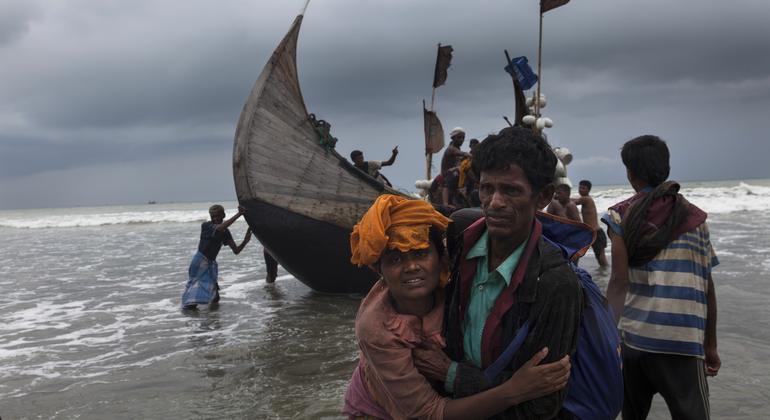World News Briefing: Trafficking Victims Need More Support, Death Risks from Inactivity, Iraq Executions


In his report to the Human Rights Council in Geneva, Special Rapporteur Siobhan Mullally said that 2018 Global Compact for Safe, Orderly and Regular Migration commits states to “save lives and prevent deaths and injuries of migrants through individual or joint search and rescue operations” at sea.
However, that will not prevent at least 8,565 people from dying on roads worldwide in 2023, “making this the deadliest year in history”, Ms Mullally said. She added that more than half of all deaths are due to drowning.
“For victims of human trafficking at sea, first of all, the right to life must be guaranteed as a basic and inviolable human right. States have an obligation to ensure that maritime actors can fulfill their obligations to those in distress at sea,” she said.
Search and rescue
“It is therefore essential that maritime stakeholders are fully supported in fulfilling their search and rescue obligations under international law. Those obligations must be carried out without discrimination or without regard to the condition of those rescued.”
Ms. Mullally emphasized the critical situation facing Rohingya refugees, many of whom are at risk of being trafficked at sea, including many refugee children.
Nearly 4,500 Rohingya embarked on perilous sea journeys in 2023, and 569 are believed to have died or gone missing, she said. Compared to a year ago, the number of people who left shore increased by 21%, while the number of those who died or went missing increased by 63%.
One-third of adults are at risk of disease due to lack of exercise
Almost a third a new study conducted by World Health Organization researchers (WHO) revealed.
If this trend continues, inactivity levels are expected to increase to 35 percent by 2030.
“Physical inactivity is a silent threat to global health, contributing significantly to the burden of chronic disease,” said Dr Rüdiger Krech, WHO director of health promotion.
According to WHO recommendations, adults should do 150 minutes of moderate-intensity exercise – or 75 minutes of vigorous-intensity activity – every week. Physical inactivity puts adults at higher risk for cardiovascular diseases such as heart attacks and strokes, type 2 diabetes, dementia, and cancers such as breast and colon cancer.
The highest rates of physical inactivity were observed in high-income Asia-Pacific (48%) and South Asia (45%), while levels of physical inactivity in other regions varied. ranging from 14% in Oceania to 28% in high-income Western countries.
Gender gap
Physical inactivity remains more common among women globally than men, with inactivity rates of 34% compared to 29%. In some countries, this difference is as high as 20 percentage points.
Additionally, people over 60 are less active than other adults, highlighting the importance of promoting physical activity for this age group.
Despite the worrying results, nearly half of the world’s countries have made some improvements over the past decade, and 22 countries were identified as likely to meet the global target of reducing inactivity by 15% by 2030.
Iraq’s scale of arbitrary executions may amount to crimes against humanity
The “systematic” execution of prisoners sentenced to death based on confessions extracted through torture under “vague” anti-terrorism laws amounts to arbitrary deprivation of life and may constitute crimes against humanity, a group of human rights experts said on Thursday.
“We are alarmed by the high number of publicly reported executions since 2016, totaling nearly 400, including 30 this year, and the clear political commitment to continue carrying out the death penalty,” the experts appointed by the UN Human Rights Council said.
This continued “complete disregard” of reported violations in the administration of justice, cases of enforced disappearances and tortured confessions, the Special Rapporteurs added. has driven sentencing policy.
Experts say that because there are about 8,000 prisoners on death row in Iraq, arbitrary executions that are widespread and systematic could amount to crimes against humanity.
They said Iraq and other countries that retain the death penalty for ordinary crimes must only apply the penalty for “the most serious crimes,” meaning intentional murder.
‘It’s worrying’
“We stress that most of the crimes detailed in articles two and three of the anti-terrorism law number 13 of 2005… do not meet the threshold of ‘most serious crimes’, making these executions arbitrary in nature,” the experts said.
“The use of the death penalty for political purposes, primarily against Iraqi Sunni men, is extremely disturbing.”
They again called on the Iraqi Government to immediately stop all executions, ensure fair retrials for prisoners on death row, especially those charged with terrorism, and promptly conduct comprehensive and impartial investigations.
Special Rapporteurs and other UN agencies Dong Nhan Quy Association– The appointed rights experts are independent of any government, receive no salary for their work and serve in their personal capacity.




